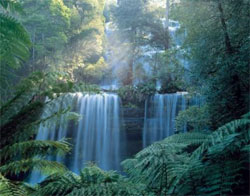 In an encouraging shift away from the status quo, many Christian groups are taking a more focused look at stewarding God's creation. A few notable references to biblical environmentalism have been popping up in the news lately. On the recently aired CNN series "God's Warriors," Richard Cizik explains "creation care," a conservative evangelical approach to being a greener church. Two weeks ago, the pope took to a stage in Italy in green vestments to declare Sept. 2, "Save Creation Day," and beseech Roman Catholics to make "courageous decisions" to spare the earth from destructive and irresponsible development trends.
In an encouraging shift away from the status quo, many Christian groups are taking a more focused look at stewarding God's creation. A few notable references to biblical environmentalism have been popping up in the news lately. On the recently aired CNN series "God's Warriors," Richard Cizik explains "creation care," a conservative evangelical approach to being a greener church. Two weeks ago, the pope took to a stage in Italy in green vestments to declare Sept. 2, "Save Creation Day," and beseech Roman Catholics to make "courageous decisions" to spare the earth from destructive and irresponsible development trends.
Theologically, the Torah provides plenty of fuel to go green. In fact, humanity is bound to the earth in ways that we may never fully appreciate.
- Genesis 2:7 tells us that God formed us from the very earth we inhabit (man = earth + breath).
- The Hebrew word "adam" (Strongs # 121 and # 122) is the root of the word for earth; Adamah (# 127), tying the reddish hue of dust to the color of blood.
- Through the sabbatical system (Shemitta in the Jewish tradition), both man and creation are entitled rest at a six to one ratio (Leviticus 25).
We can also learn from the Hebrew Bible rich applications of social uplift through proper stewardship of the earth in the form of the Jewish tradition of Peah. In Leviticus (19:9-10, and 23:22) the Israelites were told to leave the edges of all their fields and the fallen fruits "for the poor and the stranger (JPS)." Additionally, the socially engaging agri-practice of the Ma'aser Ani (the 'poor tithe' in the Jewish tradition) was a tenth of a landowner's crop set aside for the less fortunate during the third and sixth years of the seven-year sabbatical cycle.
The increasing trend of environmental awareness in the Christian faith is both hopeful and historically rooted. Wendell Berry, a modern prophet who speaks boldly of our responsibilities to the Creator's handiwork, recognizes that creation includes both the world around us and the people who live upon it. He writes, "Creation is not in any sense independent from the Creator, the result of a primal act long over and done with, but is the continuous, constant participation of all creatures in the being of God (Christianity and the Survival of Creation, 1992)." As the central achievement of God's design, we have both the honor and responsibility to protect the rest of creation, and to return to a green orthodoxy.
 Logan Laituri is a six-year Army veteran with combatant service in Iraq during OIF II and experience with Christian peacemaker teams in Israel and the West Bank. He is an active member of Iraq Veterans Against the War and currently resides in Camden, New Jersey, in an intentional Christian community called Camden House, where he continues to seek ways to wage peace wherever he goes. He blogs at courageouscoward.blogspot.com.
Logan Laituri is a six-year Army veteran with combatant service in Iraq during OIF II and experience with Christian peacemaker teams in Israel and the West Bank. He is an active member of Iraq Veterans Against the War and currently resides in Camden, New Jersey, in an intentional Christian community called Camden House, where he continues to seek ways to wage peace wherever he goes. He blogs at courageouscoward.blogspot.com.
Got something to say about what you're reading? We value your feedback!